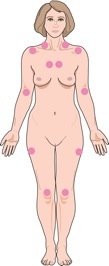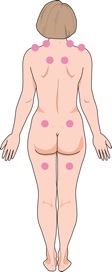-
Muscle & Bone Problems





Fibromyalgia
Fibromyalgia is a chronic, arthritis-like illness. It affects the muscles, not the joints.
Signs & Symptoms
-
•Chronic widespread pain on both sides of the body. This lasts for at least 3 months. It is not due to any other problem. Muscle pain can be severe.
-
•Pain in 11 or more of 22 “tender points.” (These are shown at right.)
-
•Fatigue. Disturbed sleep. Anxiety. Depression.
These symptoms are also linked to fibromyalgia:
-
•Memory lapses. Problems concentrating. Feeling confused.
-
•Chronic headaches. Jaw pain. A tingling feeling in the limbs.
-
•Irritable bowel. Swelling and pain in the abdomen. Gas. Constipation. Diarrhea.

Causes
The exact cause is not known. Factors thought to play a role include:
-
•An illness caused by an infection. Emotional or physical trauma.
-
•Hormones. Women are affected more often than men.
-
•Brain chemicals and muscles don’t function like they should.
Treatment
-
•Exercise therapy.
-
•Medication to treat symptoms.
-
•Massage therapy.
Tender points of fibromyalgia.




Does a person with fibromyalgia have severe pain, depression, or anxiety? Is prescribed treatment not helping?
Do symptoms get worse or do you have new symptoms?
Self-Care / Prevention
-
•Follow the treatment plan advised by your doctor.
-
•Use biofeedback. Use relaxation techniques. Meditate.
-
•Take warm baths. Use a heating pad. Massage sore muscles.
Questions to Ask



Get more information from:
HealthyLearn® | www.HealthyLearn.com. Click on MedlinePlus®.
Co-Cure Information Exchange | www.co-cure.org




Copyright © 2009, American Institute for Preventive Medicine. All rights reserved.